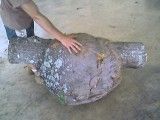Q.
Does the Doyle scale allow for saw kerf? Does it allow for a certain percentage waste as pith or does it assume "boxed heart" lumber? If I wanted 1000 BF total finished lumber, how much should my overage be, using the Doyle scale (cut 10 % more per the scale)?
Forum Responses
The Doyle scale, like most scales, estimates the lumber you can get from a log. Therefore, saw kerf is considered. However, the Doyle scale has an added feature--for smaller logs it under-estimates the actual volume you will recover. So, it may estimate 100 BF, but you will actually achieve 140 BF. With thinner kerf, you will get slightly more than with a thick kerf--about 4% more, unless you use a really thin kerf. Of course, the excessive opening face size and over-edging will waste even more than a thicker kerf.
Why does Doyle do this? The idea today is that smaller logs cost more to handle, so rather than subtract from the actual footage (Int. 1/4 inch scale), and possibly make the logger upset (or pay less for smaller logs), the Doyle scale automatically covers the extra handling cost.
Gene Wengert, forum technical advisor
Gene Wengert, forum technical advisor
I need to know how to reduce the scale for bogus logs. What should my target sizes be? What should my target 1st face be? On this mill, I have a hard time getting a small dog board (4/4 shim behind, between blocks and cant and about 3/4" bearing on carriage for last (8/4) rip, the log dogs don't seem to come close enough to the blocks).
Gene Wengert, forum technical advisor
